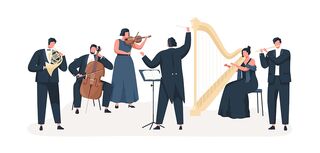Play
Peter Drucker and Music: A Masterclass in Super-Achievement
Life lessons from Bach, Mozart, and Verdi.
Posted November 8, 2022 Reviewed by Ekua Hagan
Key points
- Peter Drucker drew insights from classical musicians and composers for self-development.
- Unglamorous work and practice underpin super-achievement.
- Super-achievement requires concentrating one's efforts, focusing on priorities, and determining “the score” for one's life and work.

Music was an integral part of Peter Drucker’s life, beginning as a boy in early 20th century Vienna, Austria. In the first chapter of his 1978 memoir Adventures of a Bystander, Drucker notes that his grandmother had been a young pianist, a pupil of Clara Schumann, and “was asked by her several times to play for Johannes Brahms, which was Grandmother’s proudest memory.” She even played at a charity concert conducted by Gustav Mahler in 1896.
Inevitably, music-related examples made their way into Drucker’s writing, consulting, and teaching. He took consulting clients to concerts by the Los Angeles Philharmonic, not far from his home in Claremont, California. He was a pro bono advisor/consultant to various arts-based organizations, including the League of American Orchestras. Examining what made musicians and composers exceptional helped Drucker illustrate concepts about personal/professional development applicable to knowledge work. (In the late 1950s, Drucker coined the term “knowledge workers” to describe people who work with what they know and learn and whose knowledge is not dependent on any one employer or industry.)
In the 1997 book Drucker on Asia, Drucker outlines seven formative experiences as a young man in Europe in the late 1920s that shaped his later career. The first experience was taught (indirectly) by the Italian composer Giuseppe Verdi (1813-1901). Drucker explains that while a young college student at Hamburg University in Germany, he attended the Hamburg Opera once a week, on free university student tickets. One night the performance was Falstaff, written by Verdi in 1893. Drucker writes: “I was totally overwhelmed by it. I had a good musical education as a boy as the Vienna of my youth was an extremely musical city. Although I had heard a great many operas, I had never heard anything like this. I have never forgotten the impression that evening made on me.”
He soon realized that Verdi published the youthful-sounding opera at the age of 80. Drucker found out that Verdi had written that although his lifelong pursuit of perfection always eluded him, he wanted to give it one more try. After witnessing Falstaff, Drucker vowed that Verdi’s words about striving for perfection would be a guiding principle for his own life.
Habits, practice, and effectiveness
Also using musical examples, Drucker’s classic 1967 book The Effective Executive describes the unglamorous work and practice that underpins high-level achievement. He writes that effectiveness is a habit: “… a complex of practices. And practices can always be learned … Practices one learns by practicing and practicing and practicing again.”
Drucker’s piano teacher as a young boy in Vienna told him that while he could not play Mozart the way renowned pianist Artur Schnabel did, “there is no reason in the world why you should not play your scales the way he does.”
Drucker invokes Mozart in the chapter, “First Things First” to illustrate why knowledge workers should focus on one priority at a time. He notes that Mozart could “work on several compositions at the same time, all of them masterpieces. But he is the only known exception. The other prolific composers of the first rank—Bach, for instance, Handel, Haydn, or Verdi—composed one work at a time. They did not begin the next until they had finished the preceding one, or until they had stopped working on it for the time being and put it away in the drawer. Executives can hardly assume they are “executive Mozarts,” Drucker noted.
In a 1999 lecture on self-management, Drucker cited Mozart as an example of high-level concentration in a description of “super-achievers,” and the importance of knowing when to say no. He observed that, apart from his formidable composing abilities, Mozart was a virtuoso pianist and violinist. But because of the time necessary for practice (three hours at each instrument a day, according to Drucker), Mozart gave up the violin to concentrate on the piano.
Self-knowledge and learning from success
Artur Schnabel also makes a cameo appearance in Adventures of a Bystander. At the age of 12, Drucker was allowed to sit in on a lesson Schnabel gave to a “classmate’s sister who was a musical prodigy and had already made her professional debut.” While noting the student’s technical competence, Schnabel observed that she was playing not what she heard, but what she thought she should have heard. After her more successful attempt, Schnabel said to the observing Drucker, “Do you hear it? That’s good. As long as you play what you hear, you play music.”
However, Drucker summoned the self-knowledge to realize that he “never heard well enough to be a musician. But I suddenly perceived that I myself would always learn by looking for performance. I suddenly realized that the right method, at least for me, was to look for the thing that worked and for the people who perform. I realized that I, at least, do not learn from mistakes. I have to learn from successes.”
Conductors, leaders, and the score
Drucker also wrote and taught about the conductor-CEO analogy, particularly in a 1988 Harvard Business Review article, “The Coming of the New Organization.” He discusses the phenomenon of following and playing “the score” and how that can be applied beyond an orchestra. The conductor, whom he likened to a Chief Executive Officer/CEO, can help focus a musician’s “skill and knowledge on the musicians’ joint performance.” This, in Drucker’s estimation, is the focus that leaders of businesses and other organizations should also strive for. However, he writes that “a business has no “score” to play except the score it writes as it plays.”
Determining what the score is and should be for our own life and work is a never-ending task. However, Drucker’s music-related lessons are a masterclass in super-achievement.
References
Drucker on Asia: A dialogue between Peter Drucker and Isao Nakauchi (Butterworth-Heinemann, 1997)
Peter F. Drucker: Adventures of a Bystander (Harper & Row, 1978)
Peter F. Drucker: "The Coming of the New Organization," Harvard Business Review, January-February 1988
Peter F. Drucker: The Drucker Lectures: Essential Lessons on Management, Society, and Economy (McGraw Hill, 2010)
Peter F. Drucker: The Effective Executive: The Definitive Guide to Getting the Right Things Done, 50th anniversary edition (Harper Business, 2017)




